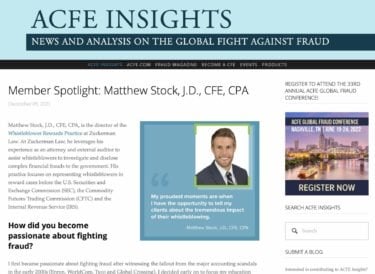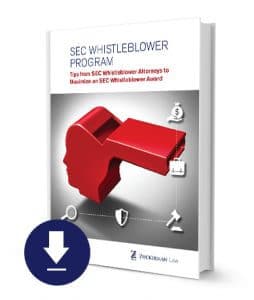Awards for “Related Actions” under the SEC Whistleblower Program

A successful SEC action is prerequisite to a related action award (the statute requires a successful SEC action before there can be a “related action” upon which a whistleblower may recover). Hong v. SEC, 41 F. 4th 83 (2d Cir. July 21, 2022)
A “related action” is defined as a judicial or administrative action brought by:
- the Attorney General of the United States;
- an appropriate regulatory authority;
- a self-regulatory organization; or
- a state attorney general in a criminal case.
An “appropriate regulatory authority” means the Commission, the Comptroller of the Currency, the Board of Governors of the Federal Reserve System, the Federal Deposit Insurance Corporation, the Office of Thrift Supervision, and any other agencies that may be defined as appropriate regulatory agencies under Section 3(a)(34) of the Exchange Act (15 U.S.C. 78c(a)(34)).
A “self-regulatory organization” means any national securities exchange, registered securities association, registered clearing agency, the Municipal Securities Rulemaking Board, and any other organizations that may be defined as self-regulatory organizations under Section 3(a)(26) of the Exchange Act (15 U.S.C. 78c(a)(26)).

The SEC is not obligated to notify a whistleblower about related action awards for which the whistleblower may qualify. An experienced SEC whistleblower attorney can help a whistleblower monitor related action proceedings and apply for related action awards.
Criteria Governing a Potential Related Action Award Entailing a Potential Recovery from a Comparable Whistleblower Award Program
On August 26, 2022, the SEC adopted an amended related action award rule that applies where a claimant’s application for a potential related action may also involve a potential recovery from a comparable whistleblower award program. As explained in a fact sheet explaining the rules, the SEC applies the following criteria:
- Under Exchange Act Section 21F(b) and Rule 21F-11, a whistleblower who obtains an award based on a Commission-covered action also may be eligible for an award based on monetary sanctions that are collected in an action brought by other statutorily-identified authorities.
- The amendments allow the Commission to make an award for a related action that might otherwise be covered by an alternative whistleblower program even where the alternative whistleblower program has the more direct or relevant connection to the related action in certain circumstances.
- If a claimant files a related-action award application, and the alternative award program is not comparable to the Commission’s program, the Commission will treat the non-Commission action as “related” for purposes of the Commission’s award program (regardless of whether the alternative award program has a more direct or relevant connection to the action). Under the amendment, a program is not comparable if that program’s statutory award range is more limited, its awards are subject to an award cap, or it is discretionary and not mandatory. Further, the Commission will make an award on a potential related action without regard to which program had the more direct or relevant connection to the action if the maximum award that the Commission could pay on the action would not exceed $5 million.
- Under the amendments, a whistleblower will be required to make an irrevocable waiver of any claim to an award from the other whistleblower award program.
What is the Process to Seek an SEC Whistleblower Award?
SEC Whistleblower Lawyers
If you are aware of securities fraud and need immediate representation, contact the SEC whistleblower lawyers at Zuckerman Law at 202-262-8959.






Click below to hear SEC whistleblower lawyer Matt Stock’s tips for SEC whistleblowers:
Recently the Association of Certified Fraud Examiners published a profile of SEC whistleblower lawyer Matt Stock’s success working with whistleblowers to fight fraud:
To learn more about the SEC Whistleblower Program, download Zuckerman Law’s eBook: SEC Whistleblower Program: Tips from SEC Whistleblower Attorneys to Maximize an SEC Whistleblower Award:
September 2020 Amendment to SEC Related Action Rule
The September 2020 SEC release adopting amendments to the rules governing the SEC Whistleblower Program explains the rationale for adopting Rule 21F-4(e):
With respect to comments relating to bankruptcy proceedings, our statutory authority does not extend to paying whistleblower awards for recoveries in bankruptcy proceedings or other proceedings that may in some way “result from” the Commission’s enforcement action and the activities of the whistleblower. Under Section 21F, we are authorized to pay whistleblower awards only on the basis of monetary sanctions that are imposed “in” a covered judicial or administrative action or related action.53 A “covered judicial or administrative action” is an action “brought by the Commission under the securities laws that results in monetary sanctions exceeding $1 million,”54 while a “related action” must be brought by one of the enforcement and regulatory authorities specified in the statute.55 Bankruptcy proceedings are not brought by either the Commission acting under the securities laws or by one of the designated related-action authorities, and orders to pay money that result from bankruptcy proceedings are not imposed ““in” Commission covered actions or related actions. The same is true of monetary payments that may result from other forms of proceedings that are not Commission covered actions or related actions.56
Defining “monetary sanctions” to include payments that are ordered “as relief for the violations that are the subject of the … action” is most consistent with our statutory authority. As noted, Section 21F(a)(4) of the Exchange Act defines “monetary sanctions,” in relevant part, as “any monies, including penalties, disgorgement, and interest, ordered to be paid;…as a result of [any judicial or administrative] action or the settlement of such action.”57 Under accepted principles of statutory construction, the words that follow “including”–penalties, disgorgement, and interest–although not an exhaustive list, are illustrative of the general principle to be applied.58 Accordingly, as the D.C. Circuit has held, we think it is reasonable to “expand on the remedies explicitly included in the statute only with remedies similar in nature to those enumerated.”59 Because ““penalties, disgorgement, and interest” describe forms of monetary relief for the violations that are the subject of an action, this provision reflects a congressional expectation that we would pay whistleblower awards only with respect to other orders to pay money that also constitute relief for the violations. For example, although restitution is not one of the sanctions set forth after the word “including,” restitution ordered in a criminal proceeding is a form of relief for the violations that are the subject of the action, and therefore is a “monetary sanction” that will support a related-action whistleblower award.
For these reasons, we are not persuaded by the commenter who urged that we define “monetary sanctions” to include a court’s orders to pay a receiver’s fees or billings from attorneys, accountants, or other professionals. Treating a court order to pay such fees as a “monetary sanction” would not comport with the statutory language (as just discussed).60
Additionally, as the Proposing Release stated, this conclusion is buttressed by Congress’s use of the phrase “monetary sanctions imposed in the action” in further describing the sanctions that would support a whistleblower award.61 While in normal parlance a person might say that disgorgement or civil penalties were “imposed” as a result of a securities-law violation, we do not believe that one would typically say that a court order approving fees and expenses of a court-appointed receiver or other professionals hired by the receiver “impos[ed]” a monetary sanction. Rather, this language indicates that the congressional focus was on monetary obligations that are in the nature of relief for the violations that are the subject of the action.
Finally, the Proposing Release stated generally that a court order approving a receiver’s plan to distribute money to injured investors would be treated as a monetary sanction. We further clarify here, in line with Commission practice, the types of distributions to injured investors that will be treated as monetary sanctions. Although the Commission may seek the appointment of a receiver in an enforcement action filed in federal court, a receiver does not work for the Commission, represent the interests of the Commission, or even represent the interests of investors. Rather, a receiver is an officer of the court, appointed by the court to take custody of assets over which the court asserts jurisdiction (the receivership estate), for the benefit of all persons whom the court may later adjudge to have rights in the property.62 Depending on the violations charged and the attendant facts and circumstances of the case, a court order directing a receiver appointed in a Commission enforcement action to make a distribution to investors may reflect recompense to the investors of money lost as a result of the securities violations, or it instead may simply reflect a return of assets that the receiver has obtained in his custodial capacity, which is greater than the amount of money lost as a result of the violations.
For example, in a simple hypothetical case where an investment adviser is charged with violating the securities laws for misappropriating $1 million from a fund that holds $100 million, investors lost $1 million as a result of the violations. If, for some reason, a receiver were appointed in the case and the receiver were ordered to unwind the funds and return all fund assets to the investors, any amounts paid in excess of the $1 million lost as a result of the violations would be a return of custodial assets held by the receiver, and not relief for the violations.
Under Rule 21F-4(e) as amended, we first look to whether an order to pay money is expressly designated as penalty, disgorgement, or interest. If so, then that order establishes the amount of monetary sanctions in the case as to that defendant. Absent an order to pay money expressly designated as a penalty, disgorgement, or interest, we will consider whether an order to pay money to investors is in the nature of relief for the violations that were the subject of the action. In the context of a Commission covered action where a receiver is appointed and the court orders a distribution of money in the receivership estate to investors, we will begin our assessment of the amount of the applicable monetary sanctions with an amount that does not exceed the higher of (i) the ill-gotten gains received by the defendants over which the receiver has been appointed, or (ii) investors’ losses as a result of the violations. In determining the investor losses, we will consider losses that flowed from the violative conduct alleged in the covered action, to the extent such losses approximate the monetary sanctions the Commission could obtain in the covered action. In addition, we will not treat as a “monetary sanction” amounts that merely reflect a return of custodial assets to investors and not relief for the violations.63
The Release summarizes the following comments received about the proposed rule changing the definition of “monetary sanctions”:
Some commenters supported the proposed amendment to the definition of ““monetary sanctions.”40 However, one of these commenters expressed concern that if the Commission were to obtain a court order for defendants to pay “$1 million in restitution payments and $1 million in punitive damages,” the order for punitive damages might not be viewed “as relief” for the securities violations.41 This commenter recommended use of “broader terminology, without substantially changing the way [the Commission] calculates qualifying payments from the way it does now.”
Several other commenters objected to the proposed amendment.42 Some commenters argued that the proposed changes would introduce ambiguity or confusion into the rule.43 In particular, one of these commenters observed that our use of the word “required” in the proposed rule would lead to “confusion and uncertainty” and suggested that we revert to the statutory term “ordered.”44
The principal concern of objectors appeared to be that the definition of “monetary sanctions” should be flexible enough to support whistleblower awards in a variety of circumstances that did not appear to be covered by the proposed amendment. For example, several commenters urged that the definition of ““monetary sanctions” should permit payments to a whistleblower based on recoveries by a bankruptcy trustee to the same degree as a receiver appointed in a Commission enforcement action.45 One of these commenters asserted: “While Ponzi cases often go into receivership, public company accounting frauds … often end up in federal bankruptcy court. It is important for corporate whistleblowers to know they will be rewarded for turning in their company even if exposing the fraud ends up bankrupting the company.”46 Another of these commenters similarly supported awards in connection with bankruptcy proceedings, making the point that “[t]he primary purpose of the two proceedings is essentially the same: to place control of the company in the hands of a disinterested party in order to properly run, reorganize or liquidate the business and protect investors and creditors.”47
In addition to including bankruptcy cases, one commenter argued that the definition of “monetary sanctions” should be broad enough to permit awards in other forms of proceedings “where sanctions or settlements result because of the Commission’s work and/or the whistleblower’s tip….”48 This commenter urged that “the definition of ‘monetary sanctions’ should be sufficiently flexible … to allow the Commission to consider sanctions obtained in any proceeding which results from the Commission’s action (or a “related action’), where there is a strong nexus (e.g., a common nucleus of operating facts) between the matter in question and the whistleblower’s tip and the ensuing investigation, and results in monetary relief for injured parties such as investors. In other words, the Commission’s definition of ‘monetary sanction’ should be sufficiently flexible to accurately reflect what the whistleblower’s tip accomplished in the form of relief to defrauded investors.”49
This same commenter also asserted that there are many cases where the cost of recovery and administration of claims “cannibalizes” a substantial portion of the funds available for distribution to injured investors.50 The commenter gave as an example a $100 million fraud case where a receiver successfully recovers $10 million but bills $7.5 million in professional expenses and fees. In such a case, the commenter opined, it would seem unduly harsh to calculate the award on $2.5 million; an award should be based on the gross amount recovered, and not reduced because of “billings from attorneys, accountants, or other professionals.”51
Note that a related action award may be made only if, among other things, the claimant satisfies the eligibility criteria for an award for the applicable covered action in the first instance. See 15 U.S.C. § 78u-6(b); Exchange Act Rule 21F-3(b), (b)(1); Rule 21F-4(g) and (f), and Rule 21F-11(a); Order Determining Whistleblower Award Claims, Release No. 34-84506 (Oct. 30, 2018); Order Determining Whistleblower Award Claims, Release No. 34-84503 (Oct. 30, 2018).
To qualify for a related action award, it is critical for the whistleblower to prove that they voluntarily provided the same original information to the Commission and to the criminal authorities (or the other entity taking a related action), and that this information led to the successful enforcement of both the Covered Action and the Related Action. See Securities Exchange Act of 1934 (“Exchange Act”) Section 21F(b)(1), 15 U.S.C. §78u-6(b)(1); Exchange Act Rule 21F-3(a), 17 C.F.R. § 240.21F-3(a). See also In the Matter of Claim for Award, Release No. 34-84046 (Sept. 6, 2018) (for a whistleblower to obtain an award in connection with a potential related action, the whistleblower must “demonstrate [that he or she] directly (or through the Commission) voluntarily provided the governmental agency, regulatory authority or self-regulatory organization the same original information that led to the Commission’s successful covered action, and that this information led to the successful enforcement of the related action.”) (citing Exchange Act Rule 21F-11(c); 17 C.F.R. § 240.21F-11(c)).





